Embracing Uncertainty in Uganda
By Anna Glass ’24
The Global Research Institute’s Summer Fellows Program provides international experiential learning opportunities to W&M students. This post is one installment of a series highlighting the 2022 Fellows’ key discoveries and formative experiences.
I challenge myself to embrace uncertainty. But I face a limited volume of unknowns in Williamsburg, Virginia. I know how long it takes to walk to class and when the lines are shortest at the dining hall. Living and working in Uganda, every experience invited unknowns. I learned as much from a trip to the grocery store as I did from a fieldwork excursion across the country. The Global Research Institute’s Summer Fellows Program empowered me to thrive in uncertainty.
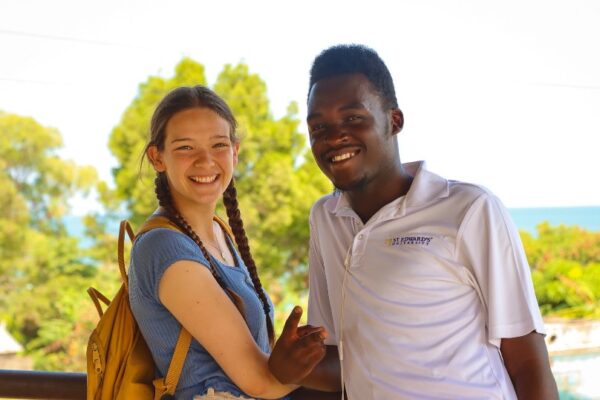
Anna Glass and Shakiib Wauyo, an intern from St. Edward’s University, in front of Lake Victoria in Entebbe, Uganda.
The most fulfilling uncertainty came from field research trips to all corners of Uganda. The Global Research Institute’s Digital Inclusion and Governance Lab (DIGLab) partnered with KEIPhone Global to understand how providing smartphone and data access for women impacts financial inclusion, household consumption, and education. KEIPhone provides free smartphones and cell phone data to women in rural Uganda using an advertisement-based revenue model. We encountered another type of exceptional unknown on the fieldwork trips — we were trusted as undergraduate students to do challenging, meaningful work that impacts the world outside of William & Mary. Along with the KEIPhone team, we distributed smartphones and trained women in rural villages to use smartphones to access financial services. Holi — another Summer Fellow — and I designed a survey and interviewed phone recipients in Masaka two weeks after a smartphone distribution. Our interviews revealed patterns that would inform our randomized control trial.
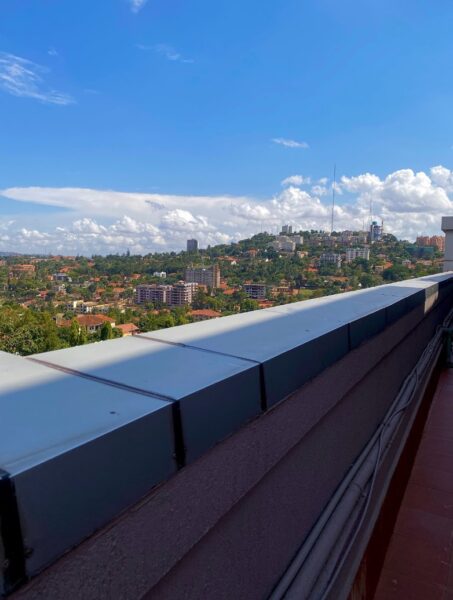
Overlooking Kampala, Uganda from the roof of the KEIPhone office building.
This summer, I also got really good at crossing the street. Pedestrian infrastructure is minimal in Uganda’s capital city, Kampala — only the highways have traffic lights and crosswalks. The streets are filled with a distinct whirring and screeching as motorbikes speed up to pass each other and soon halt for the next wave of traffic. I avoided mentioning these traffic conditions to my mom, but the hustle and bustle was no different from New York City, where making your way across the road might involve muscling your way through traffic instead of waiting for lights to turn from a warning hand into a walking man. Crossing the street in Kampala was an exercise in trusting my own judgment amid uncertainty. I learned to navigate new norms between vehicle and pedestrian — the cars know to watch for people crossing the street — and decided to take action even when I had to decide the safest route instead of relying on traffic conventions. Learning to navigate an unfamiliar environment, especially when that means accepting and overcoming risk, felt empowering.
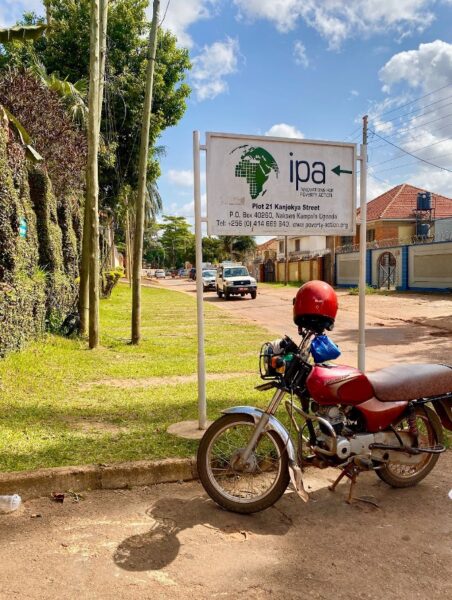
A motorcycle parked on the road outside of the Innovations for Poverty Action office.
We found time to adventure and explore areas outside of the capital city with new, long-lasting friends. Holi and I were fortunate to meet Emmy and Shakiib, two KEIPhone interns who grew up in Uganda before studying at St. Edward’s University in Texas. The four of us took a day trip to Entebbe, Shakiib’s home base. We stopped near Aero Beach on the shore of Lake Victoria, which houses a collection of abandoned airplanes and statues of world leaders. Notable figures included Mahatma Gandhi, Nelson Mandela, and the entire Obama family. This location falls outside of the tourist attractions and captures Ugandan history and values that I would not have experienced without Emmy and Shakiib. Another weekend, DIGLab contributors Dr. Tanu Kumar, Laura Schwartz, Holi Raparaoelina, Emmy, and I ventured to the source of the River Nile and delighted in the dozens of new bird species living on the banks of the river. During my last week in Uganda, I had the opportunity to travel to Murchison Falls National Park, where I lived out a childhood dream of seeing rhinos, elephants, lions, and leopards in the wild. I valued our opportunities to venture into new areas and educate myself about Ugandan history and nature. An unfamiliar setting proved to be unforgettable.
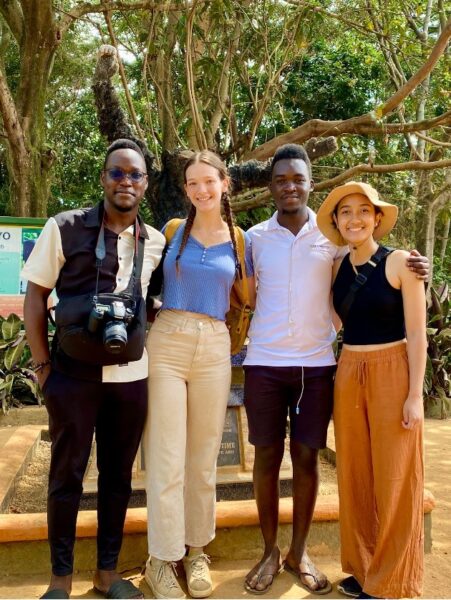
Emmy, Anna, Shakiib, and Holi at the Entebbe Wildlife Sanctuary.
I like to contrast my first trip to the grocery store in Uganda with my last — an everyday task that taught me how to embrace new cultural norms. At Capital Shoppers market in Kampala, security guards record your temperature when you enter. All guests check their bags at the door. You have to weigh your produce before entering the checkout line. At first, going to the grocery store felt like confronting all the small, everyday unknowns that accompany a new environment. On our first grocery store trip, we didn’t understand any of this. When we forgot to weigh our produce before checking out, a store clerk, Albert, was kind enough to help. From then, each day I saw him at the store we conversed about his work and mine, his thoughts on the new Capital Shoppers uniform, and how Masaka is just plain different from Kampala. On my last grocery store trip, I had spent two months intently working to understand Uganda, a country that so kindly welcomed me. What I found meaningful was that this was Albert’s last grocery store trip too. He excitedly told me that he picked up his last paycheck and would return to university in Mbarara. I said I would leave Uganda that same week. He replied “It’s too soon. If you’re ever back in UG, you can find me.” Yet, without exchanging contact information, we both embarked on our own uncertain journeys.
The Global Research Institute enabled me to choose challenging but fulfilling experiences. My summer would have been incomplete without the trust and support I received from my supervisors at GRI and KEIPhone. I learned that meaningful experiences are equal parts daunting and thrilling; with support, you are capable of more than you think, and the unknown is where all outcomes are possible.
Comments are currently closed. Comments are closed on all posts older than one year, and for those in our archive.


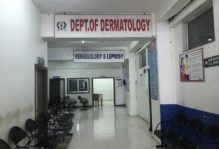
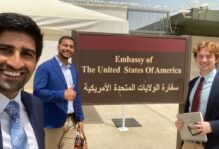
Even me am single
As a Ugandan living in Uganda, I usually enjoy learning about my country from a visitors angle. Next time meke sure you visit Mityana and play with Maranatha Integrated Schools Project children